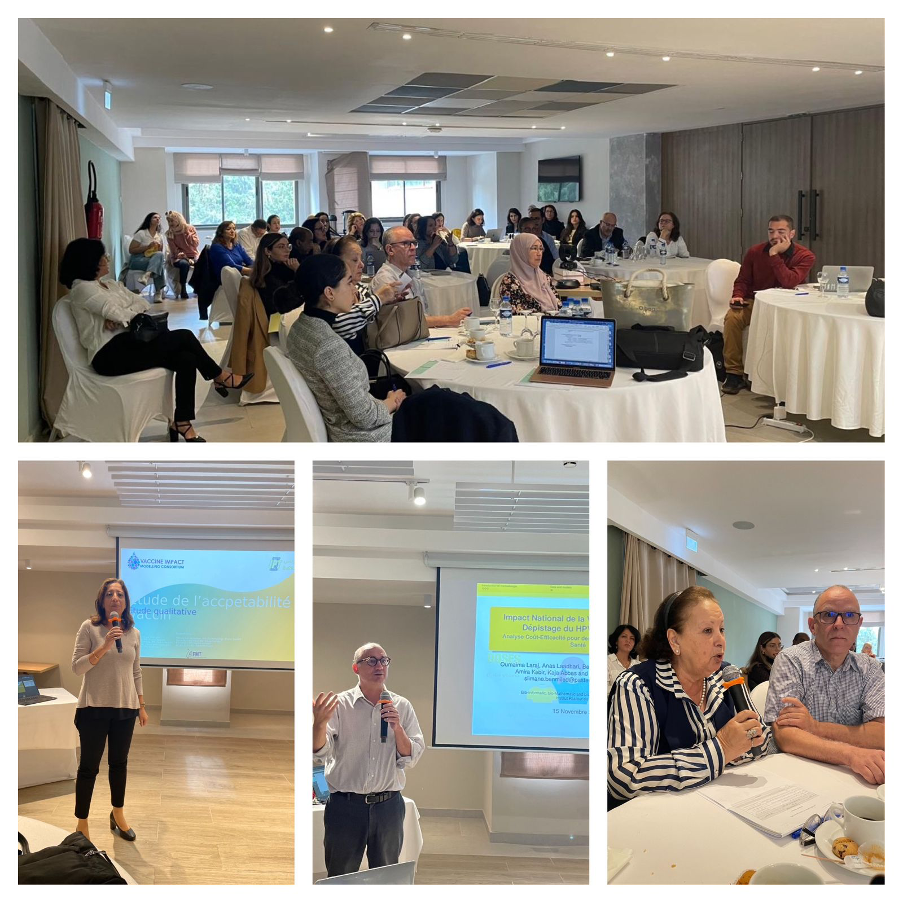En 2023, le laboratoire de Biomathématiques, Bioinformatique et Biostatistiques (BIMS) de l’Institut Pasteur de Tunis, dans le cadre du consortium VIMC (Vaccine Impact Modeling Consortium), a lancé une étude sur l’introduction de la vaccination contre le HPV et les stratégies de prévention en Tunisie, où le cancer du col de l’utérus constitue un véritable problème de santé publique.
Un an plus tard, le laboratoire BIMS a présenté les résultats de cette étude. Ces travaux ont permis de réaliser une analyse coût-efficacité des stratégies vaccinales contre le HPV, une analyse coût-efficacité des stratégies de dépistage, ainsi qu’une enquête qualitative sur la perception de la vaccination HPV.
coût-efficacité des stratégies vaccinales contre le HPV, une analyse coût-efficacité des stratégies de dépistage, ainsi qu’une enquête qualitative sur la perception de la vaccination HPV.
Pour partager ces résultats, une demi-journée scientifique a été organisée le 15 novembre 2024 à Tunis. Cet événement a rassemblé environ 40 participants issus de divers horizons : représentants des directions centrales du ministère de la Santé, experts (Comité technique de vaccination, anatomopathologistes, économistes de la santé, spécialistes en santé publique), représentants des sociétés savantes telles que la Société Tunisienne de Gynéco-Obstétrique, membres de l’UNICEF, et modélisateurs.
Cette rencontre a suscité un grand intérêt et a donné lieu à des débats riches et constructifs. Elle a également permis de conforter les décideurs dans leurs choix stratégiques, notamment sur le vaccin à déployer, la population cible, ainsi que sur la stratégie de communication à adopter.
Cette initiative marque une étape importante dans la lutte contre le cancer du col de l’utérus en Tunisie et témoigne de l’engagement collectif pour améliorer la santé publique dans le pays.
Introduction of the HPV Vaccine in Tunisia: Results and Perspectives
In 2023, the Laboratory of Biomathematics, Bioinformatics, and Biostatistics (BIMS) at the Institut Pasteur of Tunis, as part of the Vaccine Impact Modeling Consortium (VIMC), initiated a study on the introduction of HPV vaccination and prevention strategies in Tunisia, where cervical cancer represents a significant public health issue.
One year later, the BIMS laboratory presented the findings of this study. The research included a cost-effectiveness analysis of HPV vaccination strategies, a cost-effectiveness analysis of screening strategies, and a qualitative survey on perceptions of HPV vaccination.
To share these results, a half-day scientific event was held on November 15, 2024, in Tunis. The event brought together around 40 participants from diverse backgrounds, including representatives from central directorates of the Ministry of Health, experts (Technical Vaccination Committee, pathologists, health economists, public health specialists), representatives of scientific societies such as the Tunisian Society of Gynecology and Obstetrics, UNICEF representatives, and modelers.
This meeting generated significant interest and led to rich and constructive discussions. It also supported decision-makers in determining the appropriate vaccine to deploy, the target population, and the communication strategy to adopt.
This initiative represents an important milestone in the fight against cervical cancer in Tunisia and demonstrates a collective commitment to improving public health in the country.




